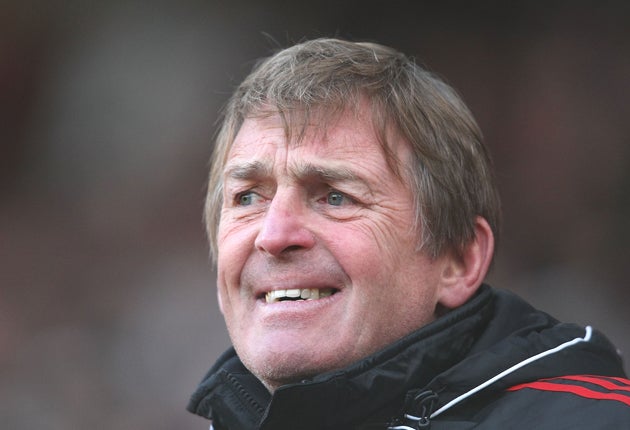The Kenny effect: Five ways Dalglish has revitalised Liverpool's season
It's been part luck, part design but the mood at Anfield has lifted. Tim Rich explores what has changed since the king's return

1. The Dalglish factor
Once, when holding a press conference to promote an underwhelming album called, without irony, Never Let Me Down, David Bowie interrupted a line of questioning with the observation: "I am David Bowie and you're not." It is similar with Liverpool's new manager. He is Kenny Dalglish and we are not. Had Roy Hodgson been in the dugout when Liverpool produced the kind of fitful performance they scraped together against Fulham, the inquest would have been long and the three points received with a grudging acceptance. However, Anfield searched for positives, emphasising the good opening and the grit to hold on against a team that had never won a match at the stadium in its history. At Newcastle, they did the same when Kevin Keegan made his brief unsatisfactory return, squeezing the positives dry, while deep down fearing it would end in tears.
2. The revival of Fernando Torres
It may have been guilt that he so rarely performed for Hodgson, it may have been because the first match of the new regime was at Old Trafford or it may be that Dalglish is simply a better man-manager, but Liverpool's finest centre-forward since Ian Rush looks a striker transformed. Torres only once played to his true potential under Hodgson – in the 2-0 victory over Chelsea. Under Dalglish, he has looked sharper and more alive, even in the defeat at Blackpool. At Molineux and on Wednesday night at Anfield, his understanding with Raul Meireles looked as instinctive as Hodgson must have hoped it would be when he bought the midfielder from Porto. Against Fulham, Torres seemed happy to shoot from distance and on sight; the sign of a centre-forward in the groove.
3. Tactical change
Like Gérard Houllier, Hodgson's tactical instincts were essentially defensive in nature. Dalglish has never favoured the all-guns blazing approach but he has tried to ensure the return of the pass and move football that was Liverpool's trademark. Christian Poulsen looks a more confident performer than the negative, inhibited footballer that Hodgson brought in from Juventus. There is more width, epitomised by the sight of both Glen Johnson and Martin Kelly going forward against Fulham. Perhaps it is simply that now they have the manager they craved, the Kop is not looking for mistakes and there is less pressure and fewer nerves around the home dressing room. However, that belies the fact that what doomed Hodgson was not the displays at Anfield, which were occasionally commanding – the 3-0 wins over Aston Villa and West Ham are prime examples – but results away from home.
4. Team spirit
Steven Gerrard thought there was little difference between the 1-0 win over Fulham and the 1-0 defeat by Wolverhampton Wanderers last month that pushed Hodgson's regime to the edge of the precipice. The difference, the Liverpool captain argued, lay in the spirit Liverpool brought to proceedings. Under Hodgson, he suggested, they might have folded.
He added that training at Melwood had been "more enjoyable" since Dalglish's assistant, Steve Clarke, took it over. That is invariably the case with a new manager simply because training is suddenly "different". However, while it is tempting to compare the second comings of Keegan and Dalglish in that they were short-term and sentimental fixes to chronic problems, the difference was that Keegan had cut himself off almost completely from the game while Dalglish continued to take a deep interest. His results have been better; seven points from his first four games compared to Keegan's three points from nine.
5. Lowered expectations
One of Hodgson's mantras was that his job was to lower expectations at Anfield and in this he succeeded admirably to the extent that during Radio Five's commentary on Liverpool's game at Wolverhampton it was suggested, not altogether jokingly, that this could be a Championship fixture next season.
Qualification for the Europa League, portrayed as a disaster under Rafael Benitez, will be greeted as a triumph under Dalglish and present the club's American owners with the dilemma of whether to go for the much talked about "young, hungry manager" or stick with the stop-gap icon.
"Seventh is not acceptable to this club, not ever," said Gerrard. "We finished seventh last year and that definitely wasn't good enough but, if you look at where we were a few weeks ago, we would have taken it then."
However, his return was not initially a difficult one. Dalglish's first two home games were Everton (who last won at Anfield 12 years ago) and Fulham (who have never won there), with Stoke, whose last victory at Anfield came in 1959, to come. Dalglish knows that he is only in the foothills of this long upward climb. The big peaks lie ahead.
Join our commenting forum
Join thought-provoking conversations, follow other Independent readers and see their replies
Comments
Bookmark popover
Removed from bookmarks